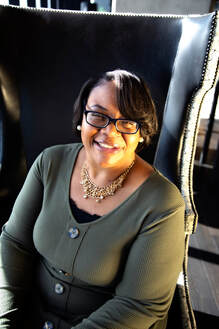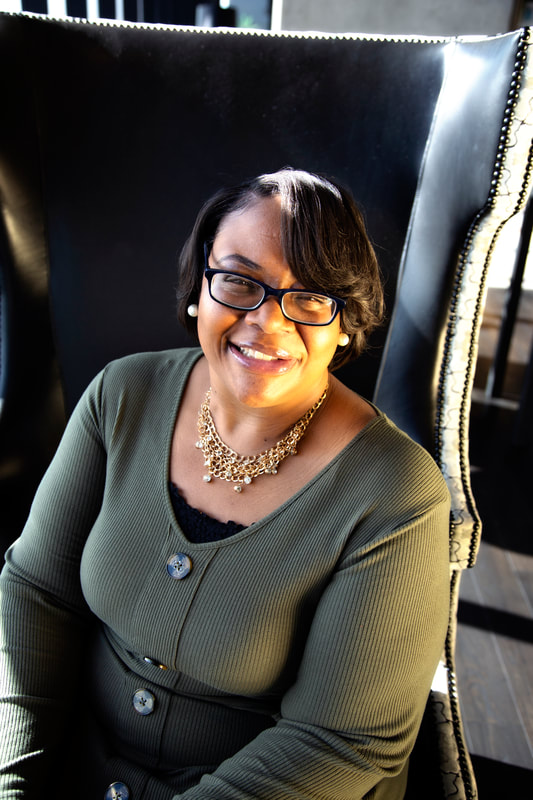Women of Color
Educational Leadership

Dr. Tadzia Dennis
Title: Higher Education and Life-Changing Consultant
Institution: University of Phoenix
Committee Chair: Vicki Purslow, Ed.D.
Research Topic: African American Women and Their Perceived Barriers to Attaining Leadership Positions: A Qualitative Case Study
Abstract: The specific problem is that African American women face significant barriers that inhibit their ability to progress in their careers and obtain administrative positions in higher education institutions (Gamble & Turner, 2015). The purpose of this qualitative case study was to investigate the perceptions held by African American women who have attained administrative positions in higher education institutions about the gender and race-based factors that may have inhibited their progress. The population of the study is women who are members of the African American Women in Higher Education association, who identify as African American and have attained an administrative position in middle and upper management in higher education. Data were collected through a questionnaire of AAWHE members, an analysis of historical data gathered from websites, and interviews of a subset of the sample that will provide historical data based on African American women in higher education administration. Three themes emerged in the research study: institutional structures, personality traits, and Caucasian men as mentors. The findings will contribute to the literature regarding African American women pursuing higher education administration positions and the barriers they experience and may facilitate the reduction of barriers.
Click the link below to download the study.
Title: Higher Education and Life-Changing Consultant
Institution: University of Phoenix
Committee Chair: Vicki Purslow, Ed.D.
Research Topic: African American Women and Their Perceived Barriers to Attaining Leadership Positions: A Qualitative Case Study
Abstract: The specific problem is that African American women face significant barriers that inhibit their ability to progress in their careers and obtain administrative positions in higher education institutions (Gamble & Turner, 2015). The purpose of this qualitative case study was to investigate the perceptions held by African American women who have attained administrative positions in higher education institutions about the gender and race-based factors that may have inhibited their progress. The population of the study is women who are members of the African American Women in Higher Education association, who identify as African American and have attained an administrative position in middle and upper management in higher education. Data were collected through a questionnaire of AAWHE members, an analysis of historical data gathered from websites, and interviews of a subset of the sample that will provide historical data based on African American women in higher education administration. Three themes emerged in the research study: institutional structures, personality traits, and Caucasian men as mentors. The findings will contribute to the literature regarding African American women pursuing higher education administration positions and the barriers they experience and may facilitate the reduction of barriers.
Click the link below to download the study.
| african_american_women_and_their_perceived_barriers_to_attaining_leadership_positions.pdf | |
| File Size: | 1314 kb |
| File Type: | |
 @NNJohnsonEdD
@NNJohnsonEdD
Dr. Natasha Johnson @NNJohnsonEdD
Title: Principal/Independent Researcher
Institution: Georgia State University
Committee Chair: Janice B. Fournillier, Ph.D.
Research Topic: Writing HERstory: Examining the Intersectional Identities of Black Women in Educational Leadership
Abstract: There is growing research pointing to the universal, collective identity of black women in the United States. While this is promising, there remains, historically, an underrepresentation of black women in and en route to the highest levels of organizational leadership. The divide is even more amplified in the field of education, a sphere in which women are largely represented as a whole. This is particularly relevant for black women considering the incongruence that lies between their heightened levels of educational attainment as compared to their generally lower status in the organizational pecking order. In the effort to advance both theory and research development in this domain, critical race feminism and social justice leadership theory serve as the frameworks for this study. Qualitative in nature, this work explored the relived experiences of four black women who serve as executives, directors, and CEOs within the realm of education. This study employed the tenets of hermeneutic phenomenology in the effort to understand and investigate the cultures in which these women lead, and the intersecting factors – including race, gender, and class – that impact these women’s ability and capability to perform within the educational sector. Using in-depth, timed, semi-structured interviews, study members were invited to reflect upon and share their experiences and perceptions as women, as women of color, as educators, and as educational leaders. Participants’ recounted stories of resilience, community, struggle, and perseverance reveal copious insights regarding the extensiveness of each participant’s leadership journey. Results indicate that inequities remain within the educational leadership sphere. The information shared and the resulting data collected revealed the necessity for equitable and inclusive leadership cultures. Indeed, there seems to be the need to educate and raise awareness about the impact of leadership cultures on black women, their experiences, and the personal and professional choices they make. In addition, the field can benefit from the establishment of more research studies related to the development and advancement of black women in the context of educational leadership.
Click the link below to download the study.
Title: Principal/Independent Researcher
Institution: Georgia State University
Committee Chair: Janice B. Fournillier, Ph.D.
Research Topic: Writing HERstory: Examining the Intersectional Identities of Black Women in Educational Leadership
Abstract: There is growing research pointing to the universal, collective identity of black women in the United States. While this is promising, there remains, historically, an underrepresentation of black women in and en route to the highest levels of organizational leadership. The divide is even more amplified in the field of education, a sphere in which women are largely represented as a whole. This is particularly relevant for black women considering the incongruence that lies between their heightened levels of educational attainment as compared to their generally lower status in the organizational pecking order. In the effort to advance both theory and research development in this domain, critical race feminism and social justice leadership theory serve as the frameworks for this study. Qualitative in nature, this work explored the relived experiences of four black women who serve as executives, directors, and CEOs within the realm of education. This study employed the tenets of hermeneutic phenomenology in the effort to understand and investigate the cultures in which these women lead, and the intersecting factors – including race, gender, and class – that impact these women’s ability and capability to perform within the educational sector. Using in-depth, timed, semi-structured interviews, study members were invited to reflect upon and share their experiences and perceptions as women, as women of color, as educators, and as educational leaders. Participants’ recounted stories of resilience, community, struggle, and perseverance reveal copious insights regarding the extensiveness of each participant’s leadership journey. Results indicate that inequities remain within the educational leadership sphere. The information shared and the resulting data collected revealed the necessity for equitable and inclusive leadership cultures. Indeed, there seems to be the need to educate and raise awareness about the impact of leadership cultures on black women, their experiences, and the personal and professional choices they make. In addition, the field can benefit from the establishment of more research studies related to the development and advancement of black women in the context of educational leadership.
Click the link below to download the study.
| writing_herstory__examining_the_intersectional_identities_of_blac.pdf | |
| File Size: | 1506 kb |
| File Type: | |

